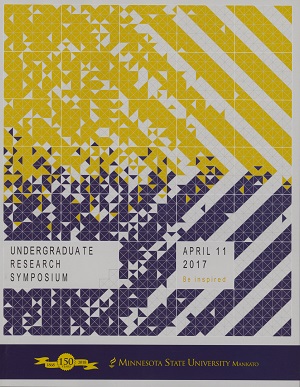MicroRNA Expression in Maize Roots Under Nitrate Starvation Conditions
Location
CSU Ballroom
Start Date
11-4-2017 10:00 AM
End Date
11-4-2017 11:30 AM
Student's Major
Chemistry and Geology
Student's College
Science, Engineering and Technology
Mentor's Name
James Rife
Mentor's Department
Chemistry and Geology
Mentor's College
Science, Engineering and Technology
Description
Nitrogen is a vital nutrient for all organisms, and nitrogen availability is a major factor in agricultural productivity. Efficient plant growth relies on control by the auxin hormone system, which helps regulate plant root systems by increasing lateral root growth. The purpose of this experiment is to explore how the expression of miR160 and miR167 responds to nitrate availability, as they have previously been shown to regulate Auxin Response Factors (ARFs). Zea mays plants were grown under normal conditions for two weeks, then subjected to nitrogen starvation for two days and finally exposed to various nitrate availabilities for 1 or 22 hours. Extraction of total small RNAs from the roots was performed with a mirVana miRNA isolation kit. The microRNAs were reverse transcribed using a TaqMan Small RNA Assay Reverse Transcription kit. The resulting cDNA was then analyzed via qPCR using TaqMan primers specific for Zea mays miR160 and miR167. The results indicated miR160 and miR167 expression in the elongation zone was lower in nitrate-free conditions compared to their expression in the 1mM nitrate samples. Relative expression levels were reversed in the root tips. Expression of these miRNAs in the root tips in the nitrate-free samples was higher relative to their expression in the 1mM nitrate samples. Future analysis of the extracted mRNAs from these samples will be conducted to see if there is a correlation between these miRNAs and ARF mRNA expression.
MicroRNA Expression in Maize Roots Under Nitrate Starvation Conditions
CSU Ballroom
Nitrogen is a vital nutrient for all organisms, and nitrogen availability is a major factor in agricultural productivity. Efficient plant growth relies on control by the auxin hormone system, which helps regulate plant root systems by increasing lateral root growth. The purpose of this experiment is to explore how the expression of miR160 and miR167 responds to nitrate availability, as they have previously been shown to regulate Auxin Response Factors (ARFs). Zea mays plants were grown under normal conditions for two weeks, then subjected to nitrogen starvation for two days and finally exposed to various nitrate availabilities for 1 or 22 hours. Extraction of total small RNAs from the roots was performed with a mirVana miRNA isolation kit. The microRNAs were reverse transcribed using a TaqMan Small RNA Assay Reverse Transcription kit. The resulting cDNA was then analyzed via qPCR using TaqMan primers specific for Zea mays miR160 and miR167. The results indicated miR160 and miR167 expression in the elongation zone was lower in nitrate-free conditions compared to their expression in the 1mM nitrate samples. Relative expression levels were reversed in the root tips. Expression of these miRNAs in the root tips in the nitrate-free samples was higher relative to their expression in the 1mM nitrate samples. Future analysis of the extracted mRNAs from these samples will be conducted to see if there is a correlation between these miRNAs and ARF mRNA expression.
Recommended Citation
Anderson, Derek. "MicroRNA Expression in Maize Roots Under Nitrate Starvation Conditions." Undergraduate Research Symposium, Mankato, MN, April 11, 2017.
https://cornerstone.lib.mnsu.edu/urs/2017/poster-session-A/34




